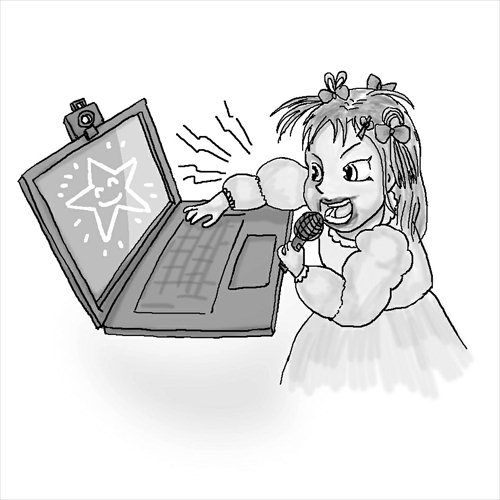Cyber-celebrity culture is warping Chinese youth

Illustrations: Lu Ting/GT
When I asked my 15-year-old cousin about her ideal occupation, she gave me an unusual answer, saying that she dreams of becoming an online celebrity. Indeed, she is skillful at promoting herself on her social networking platforms and has techniques such as constantly uploading selfies down to an art. Perhaps becoming an Internet celebrity really is in her stars.
Watching my cousin expose herself to the world reminded me of the recent online debut of a new girl band from Anhui Province that has made waves on the interwebs. These teens, who call themselves "Sunshine," have quickly garnered infamy across China because of their "unattractive" and "fat" appearance and laughably bad singing skills. But rather than wither at the insults hurled at them daily by their 430,000 followers on Weibo, they seem to thrive on the criticism.
This of course is not the first time that ugly, untalented wannabe celebrities have made headlines in China. Back in 2006, before social media and mobile apps were invented, Furong Jiejie ("Sister Lotus"), a 20-something woman in Beijing, ingeniously used an old-fashioned blog to achieve fame and fortune. Her narcissistic posts promoting her plump figure, plain face and inelegant dance moves won her a nationwide following as well as paid appearances on television.
Legions of ordinary, underprivileged Chinese teens with no skills but big dreams have looked to unlikely role models such as the Sunshine girls and Sister Lotus as proof that all it takes is a little self-confidence to get your name in the headlines.
Surely enough, after Sister Lotus started appearing on prime-time television, a whole slew of copycat "ugly" girls from Shenyang to Shenzhen also started blogging about themselves. And following Sunshine's explosion on social media, numerous new bands like "Power Girls" "Love-wings" and "Superstar" starring average-looking adolescent girls started popping up on people's mobiles.
It's fascinating to witness so many young Chinese girls, many who have not even started puberty yet, make spectacles of themselves online in a desperate attempt to be noticed. In most cases, these aspiring celebrities use snark instead of skill in order to gain "followers" and stand out from all the other thousands of wannabe stars.
One new noteworthy cyber-celebrity, 29-year-old post-graduate student Papi Jiang, has attracted over 8 million followers for her homemade videos about her "unpleasant" daily life, during which she uses exaggerated facial expressions and witty remarks to punctuate her experiences. There is absolutely nothing phenomenal about this person, yet because she has willingly exposed herself for the world to laugh at, this past month Papi Jiang (real name Jiang Yilei) landed herself a 12 million yuan ($1.8 million) sponsorship deal.
This kind of grassroots self-promotion is fantastic for Chinese youth who may not otherwise have any opportunities or privileges to get them ahead in China's notoriously competitive society, but for those middle-class kids who come from good backgrounds and receive excellent educations, there is a rising concern among parents that social networking is distracting them from academics.
According to a 2015 report released by China Internet Network Information Center, over 40 percent of China's 688 million netizens are under 24 years old, with the weekly amount of time dedicated to online surfing among teen students averaging at between 14 and 29 hours - far longer than students spend studying.
My 15-year-old cousin, for example, is addicted to social sites and spends most of her spare time "beautifying" her selfies. Surely if she spent as much time studying - or even learning a particular skill such as acting or singing - as she does on her smartphone, she would be worthy of someday becoming a true star.
Sadly, as has happened to most cyber-celebrities, these so-called stars quickly fade from people's memories once a new meme pops up. But this is not as bad as what also tends to happen to Internet celebrities, which is the online record they leave behind of their ludicrous and sometimes scandalous behavior. Prospective employers and even potential spouses will eventually see these photos and videos, which could affect their futures.
The good news is that, in today's Internet age, fame and fortune are easily attainable for otherwise unqualified kids, but the bad news is that their narcissistic addictions to social media will interfere with learning knowledge and real-life skills, leaving an entire generation of wired youth with absolutely no other recourse once their online followers forget about them.
The opinions expressed in this article are the author's own and do not necessarily reflect the views of the Global Times.